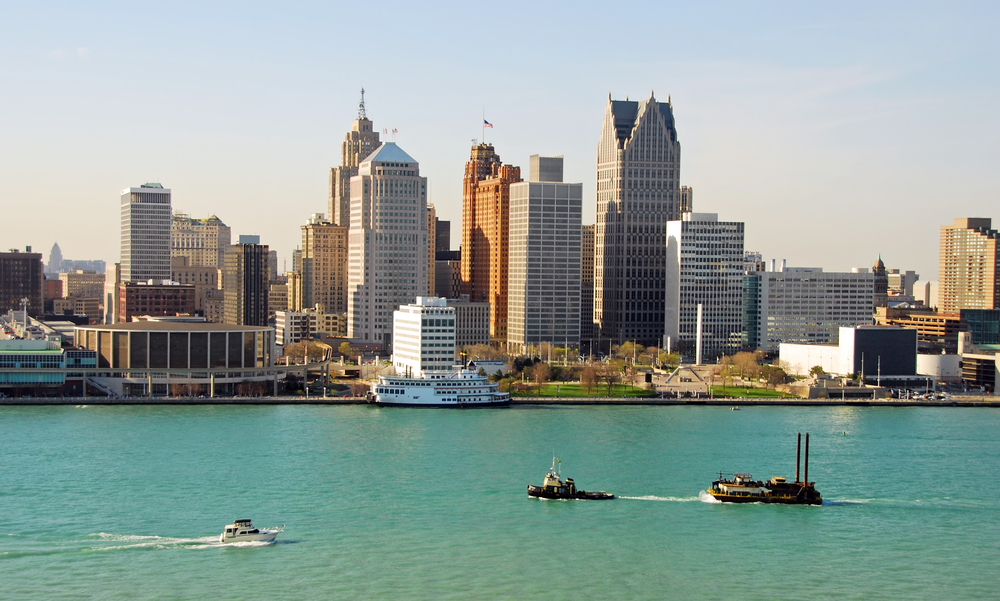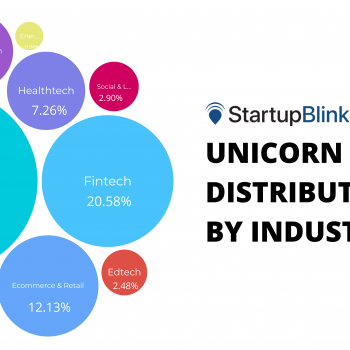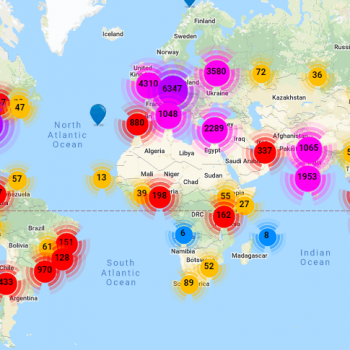
Click here to view Detroit’s Startup Map
Introduction to the Detroit Startup Ecosystem
Detroit is Motown, the Motor City, the automobile capital of the world. For decades, Detroit had a reputation as being a one-industry town. That’s changing.
Detroit and the surrounding counties have a population of about four million, many of whom left the city for the suburbs over the past several decades. More recently, though, people and businesses have started moving into the city again. The secret is out: Detroit is coming back.
Detroit – The Past, and Future
One of the major turnaround stories from the Midwestern Rust Belt from the past several years has been the fall and rise of metro Detroit, as the city went through bankruptcy in 2013-2014 and emerged on more solid ground. The last few years, in particular, have seen new developments, new construction, and revitalization of neighborhoods that many thought would never recover.
Along with the general recovery and redevelopment, an increasingly large startup ecosystem is beginning to take root. An EntryPoint report from last year shows that in the last four years, the number of Detroit venture-backed startups has increased by 54%.
Although Detroit is not the top startup city in the world, it’s in the top 100 (96th place according to StartupBlink’s latest global ecosystem rankings), which gives the city and the broader Southeast Michigan area a great deal of room to expand, grow, and thrive.
Successful Startups of Southeast Michigan
So far, one of the most prominent local success stories has been Duo Security, based in Ann Arbor and Detroit. The specialized tech security company has had a big couple of years: it achieved a $1 billion investor valuation in 2017, becoming the first Michigan startup to do so, and last year it was acquired by Cisco for $2.35 billion.
Carpooling and ride-sharing startup SPLT moved to Detroit from New York in 2016 and never looked back. Last year, SPLT notched another successful exit for the Detroit startup community when it was acquired by Bosch, the world’s largest auto-industry supplier.
In the biotech area, Ann Arbor-based Strata Oncology develops tailored, precision medicine for cancer patients with the help of genomic databases. In 2018, Strata received $26 million in Series B funding from investors led by Merck and Pfizer. That same year, it was recognized with the “Up-and-Coming Company of the Year Award” from the Michigan Venture Capital Association, helping to boost the profile of Michigan’s biotechnology sector.
Detroit companies of more traditional kinds, like manufacturing, have also made the news. Detroit watchmaker Shinola started in the Motor City in 2012 with venture capital backing and had $80 million in total orders just 18 months later. The company went from zero to 500 employees in a few years, many of whom came from the auto industry, and now has 30 stores in the U.S. and Europe. Shinola is a feel-good local story and is one of the players helping to get Detroit back into the spotlight again.
Accelerators and co-working:
Worldwide accelerator and mentor network TechStars has provided considerable support to Detroit for the past few years. Locally, the incubator TechTown Detroit provides guidance and co-working space to dozens of companies, and Motor City Match provides expert assistance and matching funding grants to successful applicants. In the suburbs, Automation Alley is a technology accelerator focused on manufacturing, and RG Medical Diagnostics provides business development and distribution support for medical product companies.
A couple of new players to watch are Omega Accelerator, which helps connect startups with funding, and Kyyba Innovations, which provides equity funding and holds pitch competitions. Lastly, Accelerate Michigan holds an Innovation Competition every year, with a nice amount of funding to its grand prize winner.
Other than TechTown, the area’s co-working spaces include Grand Circus (which also offers training boot camps for future software programmers), An Office In Detroit, Bamboo Detroit, not one but two WeWork locations, and, most recently, SpaceLab downtown and the PatchWork Collective in Ferndale.
Advantages for Startups in Detroit
Startup diversification: Practically every startup sector is represented in Southeast Michigan.
Augmented and virtual reality companies like PIXO and Electrifly Co. share the startup space with financial tech companies like Benzinga and Autobooks, food companies like Banza, broadband companies like Rocket Fiber, and many others.
Detroit also has its fair share of social entrepreneurship and triple-bottom-line businesses, many of which can be found in the city’s Green Garage and Ponyride co-working spaces.
Cost of living: Detroit and many of its suburbs have a pricier cost of living than they did a few years ago when the comeback really started. That’s what happens when the secret gets out and people want to live here again! With that said, the area still has one of the lowest costs of living compared to most other big cities in North America.
Local talent: Michigan has the highest population density of engineers in the United States.
Driverless cars: Detroit is fast becoming one of the world’s central hubs for next-generation mobility and autonomous vehicle research, driven by auto companies, the University of Michigan, Google, and many others.
Homegrown support: Some high-net-worth local supporters are committed to the success of the new Detroit, and have been for years. Dan Gilbert and his company Rock Ventures have been at the center of much of Detroit’s renaissance, and so has the Illitch family. JPMorgan Chase also helps out, with regular local investments and sponsorship of Detroit Startup Week.
Rounding out the list are a series of government initiatives and private-public partnerships, among them the New Economy Initiative, the Michigan Economic Development Corporation, and many others.
Universities: The University of Michigan is the top public research university in the U.S. when ranked by R&D expenditures. Recently, it was recognized by Princeton Review and Entrepreneur magazine as having the country’s #1 undergraduate program for entrepreneurship. The U. of M. graduates about 3,500 engineers every year (combined bachelor’s, master’s, and doctoral degrees), and it fuels a complex startup ecosystem in Ann Arbor with co-working spaces, hacker spaces, and a load of startup companies. And as it happens, Detroit is geographically closer to the Ann Arbor startup community than San Francisco is to San Jose or Cupertino.
Not that Detroit lacks academic centers of its own. Wayne State University and the University of Detroit Mercy, both based in the city, have divisions that focus on entrepreneurship and social entrepreneurship, and Lawrence Technological University is launching a new accelerator this year right next door in Southfield. The opportunities for synergy are extensive.
International geography: One more thing that sets Detroit apart from other startup hubs is that the city is north of Canada. Really! Part of Ontario curves around and down at one particular point where Michigan curves up. That puts Canada right across the river from Detroit. To get to Canada, you can drive north for a few hours, or you can just drive south.
Being right on the border, and a stone’s throw from the neighboring tech community in Windsor gives the Detroit startup sector an interesting dimension that’s not found in most other American cities.
Entrepreneur culture: Detroiters have gotten through the tough times not only with grit and creativity but with an entrepreneurial spirit going back at least to Henry Ford and the birth of the American auto industry.
Today, one thing Detroiters pride themselves on is building and helping each other from the ground level. The Build Institute provides classes at inexpensive rates to help entrepreneurs get started. Southeast Michigan has its own, locally grown chapter of the National Entrepreneurs Association, linking grass-roots business owners with each other. And the Inventor’s Association of Metropolitan Detroit connects people who have ideas to people with resources.
Moreover, a lot of what Detroit has to offer just has to do with attitude. Other cities found out about the “Detroit hustle” years ago, and it’s an attitude that the city wears with pride.
Disadvantages for Startups in Detroit
Lack of public transportation options: Getting around in the Detroit area can be challenging unless you own a car. The city has no train or subway system, except for a short “People Mover” downtown and a QLine streetcar funded by Quicken Loans that goes along part of Woodward Avenue. The city’s buses have limited range, and often require transfers and extra-long waits. For potential startup employees and founders who are used to areas with better public transportation, that’s a compromise they’ll have to make.
Hard capital: Detroit attracts its share of investor money, but there are people who feel that venture capital is still easier to come by in Silicon Valley, New York, or other major startup centers. The numbers provide some support for this theory; a PWC report indicated that in Q4 of 2017, $2.7 billion went to Silicon Valley, $5.2 billion went to San Francisco, and $2.9 billion went to New York, compared to $734 million for the entire Midwest.
Decentralization and splintering: The good news is that Detroit, and Michigan generally, have a huge web of private and governmental support organizations – many of them very well-resourced – designed to help small businesses and startup companies. The bad news is that this web, in many ways, is decentralized and disconnected.
There have been some attempts to pull all the “strands” of this web together, to provide a one-stop shop for those who want to pursue their startup dreams. The Detroit Biz Grid, with its encyclopedia-length list of resources, was one such attempt. Grow Detroit and its Detroit Startup List was another, although neither of these appears to have been updated since 2016. More recently, a new group called EntryPoint announced a strategic goal to connect Michigan entrepreneurs with resources, although it’s unclear how comprehensive this effort will prove to be in the long term.
Other cities have recognized the importance of centralizing startup resources. Chicago’s 1871, an incubator and startup headquarters, was founded years ago for this very purpose. The new center was created by entrepreneurs and allies who made a priority of building something new by bringing disparate resources together.
There’s not much question that Detroit would also benefit from a stable, go-to central organization that’s designed to help both rookie entrepreneurs and experienced serial founders get where they need to go.
New at this: And lastly, Detroit just has some of the natural disadvantages that come with not having been at this for as long as some of the other startup cities. Most of the city’s main co-working spaces, like Bamboo Detroit and WeWork, didn’t have Detroit locations before 2013. And many of the areas in the city that have been returning to life were written off by many – until recently, that is.
The bottom line is that the Detroit area is getting harder not to notice. Detroit is where Steve Case launched his Rise of the Rest tour, coming back for another stop a few years later. And many of the other new developments above only happened because of all the people who genuinely believe in the Detroit renaissance. There’s even the occasional Silicon Valley comparison.
With its automotive past and present, its startup future, its surrounding universities, its outside, and local support, all the recent attention, and its “hustles harder” spirit, Detroit might never be written off again.
About the author:
David Kohn is a patent agent, attorney, former patent examiner at the regional U.S. Patent and Trademark Office in Detroit, and the founder of Spectrum Intellectual Property, which provides services that support entrepreneurs and small businesses. Find out more at www.spectrum-ip.com, and follow Spectrum on Twitter at @Spectrum_IP.








